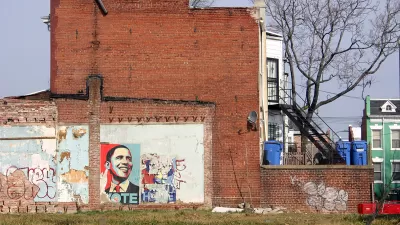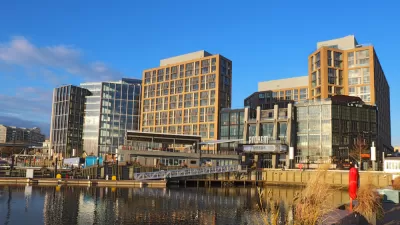A recent article in Washington City Paper pushes back on the notion that the ill effects of gentrification are overblown. Resurgent cities must, according to the article, find ways to achieve the benefits of gentrification—without the displacement.

Aaron Wiener responds to an article in The Economist proclaiming, "Bring on the hipsters" and "Gentrification is good for the poor."
First, Wiener shows some sympathy for members of the media who buy into this argument: "The notion is tempting to reporters for a number of reasons. It's counter-intuitive. It aligns neatly with an increasingly popular form of neoliberal urbanism that says the key to creating better, more affordable cities is to do away with zoning limits, parking minimums, and other regulations and simply let the cities grow. And it absolves us of guilt: We, the youngish reporters of America's major cities, are by and large the gentrifiers, as opposed to the displaced."
Wiener notes that The Economist isn't the only publication to make a similar argument—Slate also recently posted an article titled "The Myth of Gentrification."
The problem, according to Wiener, is that neither of the articles account for the fact that people are actually being displaced. Weiner goes on to cite specific examples from Washington, D.C., noting that even if only a few cities around the country are experiencing displacement at the same scale as the nation's capital, that doesn't warrant ignoring the realities of the challenge.
Writes Wiener: "As a city, we still haven't found a way to bring the benefits of gentrification without the displacement. No one has. It's the fundamental challenge of our resurgent city, and resurgent cities across the country. But it's not a very good excuse for pretending the problem doesn't exist."
FULL STORY: The “Gentrification Myth” Myth

Planetizen Federal Action Tracker
A weekly monitor of how Trump’s orders and actions are impacting planners and planning in America.

Map: Where Senate Republicans Want to Sell Your Public Lands
For public land advocates, the Senate Republicans’ proposal to sell millions of acres of public land in the West is “the biggest fight of their careers.”

Restaurant Patios Were a Pandemic Win — Why Were They so Hard to Keep?
Social distancing requirements and changes in travel patterns prompted cities to pilot new uses for street and sidewalk space. Then it got complicated.

Platform Pilsner: Vancouver Transit Agency Releases... a Beer?
TransLink will receive a portion of every sale of the four-pack.

Toronto Weighs Cheaper Transit, Parking Hikes for Major Events
Special event rates would take effect during large festivals, sports games and concerts to ‘discourage driving, manage congestion and free up space for transit.”

Berlin to Consider Car-Free Zone Larger Than Manhattan
The area bound by the 22-mile Ringbahn would still allow 12 uses of a private automobile per year per person, and several other exemptions.
Urban Design for Planners 1: Software Tools
This six-course series explores essential urban design concepts using open source software and equips planners with the tools they need to participate fully in the urban design process.
Planning for Universal Design
Learn the tools for implementing Universal Design in planning regulations.
Heyer Gruel & Associates PA
JM Goldson LLC
Custer County Colorado
City of Camden Redevelopment Agency
City of Astoria
Transportation Research & Education Center (TREC) at Portland State University
Camden Redevelopment Agency
City of Claremont
Municipality of Princeton (NJ)





























